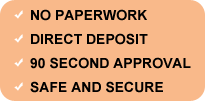
Trying to take control of your personal finances can be a real challenge. If you are like many people, you may think that the root of your financial problems is your income level. But frequently there are other factors in play which include poor money management skills, total financial illiteracy, and a lack of awareness of the problems that exist.
It may come as a surprise to learn that usually the amount of income a person earns has very little connection to how much that person spends or saves. A large majority of people live from paycheck to paycheck, stretching their earned income each month by taking on new debt in the form of credit card charges. If this sounds like the financial merry-go-round you are currently experiencing, no one has to tell you about the stress and worry that this lifestyle can cause... you are living it first-hand.
Financial freedom doesn't come easy. It usually means thinking about money in a totally different way. It requires a whole new mindset regarding saving- something many people do as an afterthought at best or not at all at worst. The one universal truth to achieving financial freedom is living below your means. If you can't spend less than you make, it won't matter how much you save, how much you earn, or how much you invest- you will never achieve financial independence.
A lot of people naturally assume that if they just earned a bigger salary, their money problems would be over. But a big salary doesn't give you a license to spend. You only have to look at star athletes who signed multi-million dollar contracts only to end up bankrupt a few years down the road to realize that money comes with its own set of rewards and problems. It doesn't matter who you are or how much money you make, if you can't live below your means the end result is going to be the same- a financial downfall.
So how can you find out if you're living above your means? You may already have a suspicion that you are but the simplest way is to look at your credit card statements. Some good indicators are:
While these are all common symptoms of living over your means, your credit card statements don't tell the whole story. You need to know where your money is going. This means tracking your spending down to the smallest detail. It will take time and patience, but without knowing where your money is going you will never be able to create a workable budget. And without a realistic budget in place, living below your means is virtually impossible.
So it should be apparent now that the key to becoming financially independent is really easy - spend less than you earn. If only it were that simple! We live in a consumer-driven society which encourages us to spend, spend, spend. If you can't afford it right now- buy it on credit. If you don't have enough cash- take out a loan. Unfortunately, that type of financial lifestyle isn't sustainable and eventually your debt will become overwhelming and unmanageable. At that point, you will be faced with some very hard financial choices.
The good news is it's never too early (or too late) to positively change your monetary habits. The following suggestions can help get you started on a smarter, more secure financial path.

